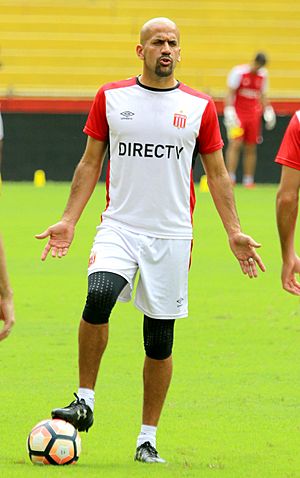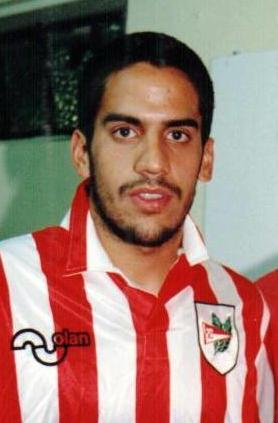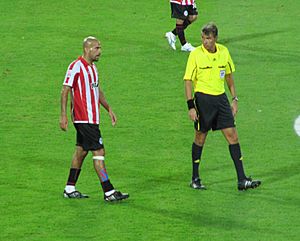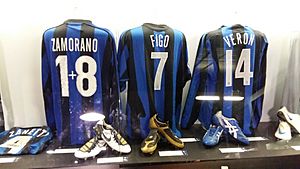Juan Sebastián Verón facts for kids
Quick facts for kids
Juan Sebastián Verón
|
|||||||||||||||||||||||||||||||||||||||||||||||||||||||||||||||||||||||||||||||||||||||||
|---|---|---|---|---|---|---|---|---|---|---|---|---|---|---|---|---|---|---|---|---|---|---|---|---|---|---|---|---|---|---|---|---|---|---|---|---|---|---|---|---|---|---|---|---|---|---|---|---|---|---|---|---|---|---|---|---|---|---|---|---|---|---|---|---|---|---|---|---|---|---|---|---|---|---|---|---|---|---|---|---|---|---|---|---|---|---|---|---|---|

Verón with Estudiantes de La Plata in 2017
|
|||||||||||||||||||||||||||||||||||||||||||||||||||||||||||||||||||||||||||||||||||||||||
| President of Estudiantes de La Plata | |||||||||||||||||||||||||||||||||||||||||||||||||||||||||||||||||||||||||||||||||||||||||
| In office 4 October 2014 – 2020 |
|||||||||||||||||||||||||||||||||||||||||||||||||||||||||||||||||||||||||||||||||||||||||
| Preceded by | Enrique Lombardi | ||||||||||||||||||||||||||||||||||||||||||||||||||||||||||||||||||||||||||||||||||||||||
| Succeeded by | Martín Gorostegui | ||||||||||||||||||||||||||||||||||||||||||||||||||||||||||||||||||||||||||||||||||||||||
| President of Estudiantes de La Plata | |||||||||||||||||||||||||||||||||||||||||||||||||||||||||||||||||||||||||||||||||||||||||
| In office 6 April 2024 – Incumbent |
|||||||||||||||||||||||||||||||||||||||||||||||||||||||||||||||||||||||||||||||||||||||||
| Preceded by | Martín Gorostegui | ||||||||||||||||||||||||||||||||||||||||||||||||||||||||||||||||||||||||||||||||||||||||
| Personal details | |||||||||||||||||||||||||||||||||||||||||||||||||||||||||||||||||||||||||||||||||||||||||
| Born |
Juan Sebastián Verón
9 March 1975 La Plata, Argentina |
||||||||||||||||||||||||||||||||||||||||||||||||||||||||||||||||||||||||||||||||||||||||
| Occupation | Footballer | ||||||||||||||||||||||||||||||||||||||||||||||||||||||||||||||||||||||||||||||||||||||||
|
Association football career
|
|||||||||||||||||||||||||||||||||||||||||||||||||||||||||||||||||||||||||||||||||||||||||
Juan Sebastián Verón, born on March 9, 1975, is a famous Argentine former professional football player. He is currently the chairman of Estudiantes de La Plata, a football club where he also used to be the Director of Sports. In 2004, Verón was chosen by the legendary footballer Pelé to be on the FIFA 100 list. This list featured 125 of the greatest living footballers at the time.
Verón has both Argentine and Italian citizenship. His nickname is "La Brujita," which means "The Little Witch." This nickname is a tribute to his father, Juan Ramón Verón, who was known as "La Bruja" (The Witch). His father was also a successful player for Estudiantes.
Verón played as a midfielder. His career began at Estudiantes, then he played for Boca Juniors in Argentina. He also played for several big clubs in Italy's Serie A, winning titles with Lazio and Inter Milan, and a UEFA Cup with Parma. He also played in England for Manchester United and Chelsea. In 2006, he returned to Estudiantes and played there until he retired in 2014, except for a short time with Brandsen. He even made a brief return to playing in 2017 for the 2017 Copa Libertadores.
For his country, Verón played 72 games for the Argentina between 1996 and 2010, scoring nine goals. He played for Argentina in three FIFA World Cups and the 2007 Copa América.
Contents
Club Football Journey
Starting at Estudiantes
In 1993, Verón joined Estudiantes de La Plata. In 1995, he helped the team get back into the top Argentine league, the Argentine Primera División. In 1996, he moved to Boca Juniors, where he played 17 games and scored four goals alongside Diego Maradona. That same year, he played his first international game for Argentina against Poland. Soon after, coach Sven-Göran Eriksson signed him to play for Sampdoria in Italy.
Success in Italy and Passport Questions
In 1998, after playing for Argentina in the 1998 FIFA World Cup, Verón signed with Parma for about £15 million. The next year, Parma won the Coppa Italia (Italian Cup) and the UEFA Cup. Coach Eriksson then signed him again, this time for Lazio in a deal worth £18.1 million. Verón's first game for Lazio was a 1–0 win against Manchester United in the European Super Cup.
In 2000, Verón was a key player for Lazio. They won the Italian league title, known as the Scudetto, the Coppa Italia, and the Italian Super Cup. He scored eight goals that season.
Around this time, there were questions about his Italian passport. Italian officials looked into whether he had obtained it correctly. However, in 2007, Verón was cleared of any wrongdoing. It was found that he did have Italian family roots through another great-grandparent, and he was allowed to keep his Italian citizenship.
Playing in England
After the 2000–01 season, Verón moved from Lazio to Manchester United on July 12, 2001. The transfer fee was £28.1 million, which was the most expensive transfer in English football at that time. He signed a five-year contract.
Verón started his first season at Old Trafford very well. In September 2001, he scored in three of Manchester United's four games, including a goal and an assist in a 5–3 win against Tottenham Hotspur. This led to him winning the Premier League Player of the Month award. However, as the season went on, he found it harder to adapt to the very fast pace of the Premier League.
In his second season, his performances improved, especially in the Champions League, where the game tempo was slower. He scored four goals and was important to United's success in the group stages. However, injuries kept him from playing much at the end of the season.
In 2003, Chelsea bought Verón for £15 million after Roman Abramovich became the club owner. Verón had a great start at Chelsea, scoring the first goal in a 2–1 win against Liverpool. But he again faced injury problems during the 2003–04 season and only played 15 games for Chelsea.
His transfers to Manchester United and Chelsea were considered very expensive at the time. Overall, his transfers added up to £77 million, making him one of the most expensive footballers in history at that point.
Back to Italy
When José Mourinho became Chelsea's manager, Verón was loaned to Inter Milan for the 2004–05 season. He then stayed on loan for another season. With Inter, he helped the team win the 2005 Coppa Italia, the 2006 Coppa Italia, and the 2005 Supercoppa Italiana. They also won the 2006 Serie A title after Juventus had their title taken away due to a match-fixing scandal.
Coming Home to Argentina
In mid-2006, Verón wanted to return to Argentina for the 2006–07 season. He received offers from Boca Juniors and River Plate, but he chose his childhood club, Estudiantes. He is a big fan of the club and had even given money to improve their training facilities. Chelsea agreed to loan him to Estudiantes until his contract with them ended.
On December 13, 2006, Verón helped Estudiantes win the Apertura 2006 tournament. This was their first title in 23 years, and they won it in a play-off match against Boca Juniors. Verón was considered one of the top three players in the Argentine League that year.
Verón also played a big part in helping Estudiantes update their historic stadium. He even spoke with the Argentine president at the time, Néstor Kirchner, to help get the project started.
In July 2007, Verón decided to stay at Estudiantes despite interest from a club in the United States. He had some minor injuries after the 2007 Copa América, which caused him to miss some games in the 2007–08 season. However, in early 2008, many football experts said Verón was the best player in the Argentine league.
Verón's fitness improved for the 2008–09 season. Estudiantes reached the finals of the Copa Sudamericana and earned a spot in the 2009 Copa Libertadores.
In 2009, he played in the Copa Libertadores again. This competition is very special for Estudiantes because Verón's father helped the team win three titles in a row from 1968 to 1970. Verón shared this strong feeling for the title. His dream came true when Estudiantes won the final in 2009 with a total score of 2–1. They tied 0–0 at home and then won 2–1 away against Brazil's Cruzeiro. Verón was voted the best player of the 2009 Copa Libertadores by fans on fifa.com.
Verón was named South American Footballer of the Year twice, in 2008 and 2009. This award is given by a newspaper in Uruguay and is recognized worldwide.
Coming Back from Retirement
In December 2016, Verón decided to play professional football again. He signed an 18-month contract to play for Estudiantes in the 2017 Copa Libertadores. He had promised to return if fans bought 65% of the special seating areas at the club's new stadium. He kept his promise and signed a contract where his minimum salary would go directly back to the club to help with daily costs. He played his first game back on January 15, 2017, in a friendly match in Florida.
Playing for Argentina
Verón was chosen to play for Argentina in the 1998 FIFA World Cup in France. Argentina was knocked out by the Netherlands in the quarter-finals. Verón helped set up Claudio López's goal in that game.
He was also called up for the 2002 FIFA World Cup in South Korea and Japan. Verón was seen as a very important player and was the captain when Roberto Ayala was injured. Argentina did not do well in this tournament, losing to England and being eliminated early.
After missing the 2006 FIFA World Cup, Verón was called back to the national team in February 2007 by coach Alfio Basile. This was because of his great performance with Estudiantes in 2006. Verón was a starting player for Argentina when they reached the final of the 2007 Copa América.
Later, due to injuries and his club's busy schedule, Verón was not in the immediate plans of national coach Diego Maradona. However, he was called back to the team as a substitute in a 4–0 win against Venezuela in March 2009. He also started in a World Cup qualifier against Colombia in June 2009. Maradona then selected him for the final 23-man squad for the 2010 FIFA World Cup.
Verón started Argentina's first group match in the 2010 World Cup against Nigeria and helped set up Gabriel Heinze's goal. He missed the game against South Korea due to injury but returned to the starting team against Greece, playing the full 90 minutes in a 2–0 win. He came on as a substitute in Argentina's 3–1 win over Mexico in the Round of 16. However, he did not play in the quarter-final loss to Germany.
On August 26, 2010, Verón announced his retirement from international football. However, he did play for Argentina again in 2011 in a special two-game series against Brazil called the Superclásico de las Américas.
After Playing Football
In December 2012, Verón returned to Estudiantes to work as the Director of Sports for the club. The club president, Enrique Lombardi, said that Verón would not be paid for this job.
Personal Life
Verón is the oldest son of Argentine football player Juan Ramón Verón. His father famously scored against Manchester United for Estudiantes in 1968. Juan Sebastián was born on the day his father played a derby match for Estudiantes against their rivals Gimnasia y Esgrima.
When he was a boy, Verón dreamed of playing for an English club called Sheffield United, because his uncle, Pedro Verde, played there. When Juan Sebastián started playing professionally, his father tried to get one of his old clubs, Panathinaikos, to sign him. But after a short try-out, they decided he wasn't good enough. After he signed with Manchester United, Verón joked, "So there I was hoping to play for Sheffield United and here I am at Manchester United!"
His son, Deian, is also a professional football player. His brother, Iani, also played football.
How He Played
Experts believe Verón was one of the best midfielders of his time and one of the best playmakers in the world when he was at his peak. He was a very talented, complete, and flexible midfielder who usually directed the game. He could play as an attacking midfielder or in the center. He could even play deeper, helping to start attacks from behind the main forwards.
Verón was known for his awareness, ability to understand the game, and his skill at winning the ball back. He could control the speed of his team's play and create scoring chances for his teammates with his excellent passes. He was also good at moving forward and scoring goals himself.
He was a strong, athletic, and hard-working player. In his best years, he was fast, had great footwork, and excellent technical skills. He also had amazing vision, creativity, and could pass the ball long distances. He had a powerful shot from far away with both feet. He was also very good at taking set-pieces, especially his powerful, bending free kicks with his right foot.
Career Statistics
Club
| Club | Season | League | National cup | League cup | Continental | Other | Total | |||||||
|---|---|---|---|---|---|---|---|---|---|---|---|---|---|---|
| Division | Apps | Goals | Apps | Goals | Apps | Goals | Apps | Goals | Apps | Goals | Apps | Goals | ||
| Estudiantes | 1993–94 | Primera División | 7 | 0 | — | — | 1 | 0 | — | 8 | 0 | |||
| 1994–95 | Primera B Nacional | 38 | 5 | — | — | 3 | 1 | — | 41 | 6 | ||||
| 1995–96 | Primera División | 15 | 2 | — | — | 1 | 0 | — | 16 | 2 | ||||
| Total | 60 | 7 | 0 | 0 | 0 | 0 | 5 | 1 | 0 | 0 | 65 | 8 | ||
| Boca Juniors | 1995–96 | Primera División | 17 | 4 | — | — | 0 | 0 | — | 17 | 4 | |||
| Sampdoria | 1996–97 | Serie A | 32 | 5 | 2 | 0 | — | — | — | 34 | 5 | |||
| 1997–98 | Serie A | 29 | 2 | 3 | 0 | — | 2 | 0 | — | 34 | 2 | |||
| Total | 61 | 7 | 5 | 0 | 0 | 0 | 2 | 0 | 0 | 0 | 68 | 7 | ||
| Parma | 1998–99 | Serie A | 26 | 1 | 6 | 3 | — | 10 | 0 | — | 42 | 4 | ||
| Lazio | 1999–2000 | Serie A | 31 | 8 | 4 | 0 | — | 11 | 2 | 1 | 0 | 47 | 10 | |
| 2000–01 | Serie A | 22 | 3 | 2 | 0 | — | 7 | 1 | 1 | 0 | 32 | 4 | ||
| Total | 53 | 11 | 6 | 0 | 0 | 0 | 18 | 3 | 2 | 0 | 79 | 14 | ||
| Manchester United | 2001–02 | Premier League | 26 | 5 | 1 | 0 | 0 | 0 | 13 | 0 | — | 40 | 5 | |
| 2002–03 | Premier League | 25 | 2 | 1 | 0 | 5 | 0 | 11 | 4 | — | 42 | 6 | ||
| Total | 51 | 7 | 2 | 0 | 5 | 0 | 24 | 4 | 0 | 0 | 82 | 11 | ||
| Chelsea | 2003–04 | Premier League | 7 | 1 | 0 | 0 | 1 | 0 | 6 | 0 | — | 14 | 1 | |
| Internazionale (loan) | 2004–05 | Serie A | 24 | 3 | 5 | 0 | — | 10 | 0 | — | 39 | 3 | ||
| 2005–06 | Serie A | 25 | 0 | 0 | 0 | — | 9 | 0 | 1 | 1 | 35 | 1 | ||
| Total | 49 | 3 | 5 | 0 | 0 | 0 | 19 | 0 | 1 | 1 | 74 | 4 | ||
| Estudiantes (loan) | 2006–07 | Primera División | 30 | 2 | — | — | — | — | 30 | 2 | ||||
| Estudiantes | 2007–08 | Primera División | 18 | 7 | — | — | 8 | 2 | — | 26 | 9 | |||
| 2008–09 | Primera División | 18 | 3 | — | — | 24 | 2 | — | 42 | 5 | ||||
| 2009–10 | Primera División | 27 | 4 | — | — | 9 | 1 | 2 | 0 | 38 | 5 | |||
| 2010–11 | Primera División | 24 | 2 | — | — | 6 | 0 | 2 | 0 | 32 | 2 | |||
| 2011–12 | Primera División | 20 | 2 | — | — | 1 | 0 | — | 21 | 2 | ||||
| 2013–14 | Primera División | 22 | 0 | — | — | — | — | 22 | 0 | |||||
| 2016–17 | Primera División | 0 | 0 | — | — | 5 | 0 | — | 5 | 0 | ||||
| Estudiantes total | 219 | 27 | 0 | 0 | 0 | 0 | 58 | 6 | 4 | 0 | 281 | 33 | ||
| Career total | 483 | 61 | 24 | 3 | 6 | 0 | 137 | 13 | 7 | 1 | 657 | 78 | ||
International
| National team | Year | Apps | Goals |
|---|---|---|---|
| Argentina | 1996 | 1 | 0 |
| 1997 | 8 | 1 | |
| 1998 | 13 | 0 | |
| 1999 | 4 | 1 | |
| 2000 | 10 | 3 | |
| 2001 | 8 | 2 | |
| 2002 | 6 | 1 | |
| 2003 | 5 | 1 | |
| 2004 | 0 | 0 | |
| 2005 | 0 | 0 | |
| 2006 | 0 | 0 | |
| 2007 | 5 | 0 | |
| 2008 | 1 | 0 | |
| 2009 | 6 | 0 | |
| 2010 | 5 | 0 | |
| Total | 72 | 9 | |
- Scores and results list Argentina's goal tally first, score column indicates score after each Verón goal.
| No. | Date | Venue | Opponent | Score | Result | Competition |
|---|---|---|---|---|---|---|
| 1 | 6 July 1997 | Estadio Defensores del Chaco, Asunción, Paraguay | 2–0 | 2–1 | 1998 World Cup qualification | |
| 2 | 4 September 1999 | El Monumental, Buenos Aires, Argentina | 1–0 | 2–0 | Friendly | |
| 3 | 29 March 2000 | El Monumental, Buenos Aires, Argentina | 2–1 | 4–1 | 2002 World Cup qualification | |
| 4 | 3–1 | |||||
| 5 | 3 September 2000 | Estadio Nacional, Lima, Peru | 2–0 | 2–1 | 2002 World Cup qualification | |
| 6 | 28 March 2001 | El Monumental, Buenos Aires, Argentina | 3–0 | 5–0 | 2002 World Cup qualification | |
| 7 | 15 August 2001 | Estadio Olímpico Atahualpa, Quito, Ecuador | 1–0 | 2–0 | 2002 World Cup qualification | |
| 8 | 27 March 2002 | Geneva, Switzerland | 1–0 | 2–2 | Friendly | |
| 9 | 20 August 2003 | Stadio Artemio Franchi, Florence, Italy | 1–1 | 3–2 | Friendly |
Honours and Awards
Estudiantes
- Primera División: 2006 Apertura, 2010 Apertura
- Copa Libertadores: 2009
- Primera B Nacional: 1994–95
- Copa Sudamericana runner-up: 2008
- FIFA Club World Cup runner-up: 2009
- Recopa Sudamericana runner-up: 2010
Parma
- Coppa Italia: 1998–99
- UEFA Cup: 1998–99
Lazio
- Serie A: 1999–2000
- Coppa Italia: 1999–2000
- Supercoppa Italiana: 2000
- UEFA Super Cup: 1999
Manchester United
- Premier League: 2002–03
Inter Milan
- Serie A: 2005–06
- Coppa Italia: 2004–05, 2005–06
- Supercoppa Italiana: 2005
Argentina
- Copa América runner-up: 2007
Individual
- FIFA World Cup All-Star Team: 1998 (Reserve)
- ESM Team of the Year: 1999–2000
- Premier League Player of the Month: September 2001
- UEFA Champions League top assist provider: 2001–02
- FIFA 100
- Footballer of the Year of Argentina: 2006, 2009
- South American Team of the Year: 2006, 2008, 2009, 2010
- South American Footballer of the Year: 2008, 2009
- Copa Libertadores Most Valuable Player: 2009
- FIFA Club World Cup Silver Ball: 2009
- Konex Award Merit Diploma as one of the five best football players of the last decade in Argentina: 2010
- IFFHS Argentina All Times Dream Team (Team C): 2021
See also
 In Spanish: Juan Sebastián Verón para niños
In Spanish: Juan Sebastián Verón para niños
 | May Edward Chinn |
 | Rebecca Cole |
 | Alexa Canady |
 | Dorothy Lavinia Brown |




